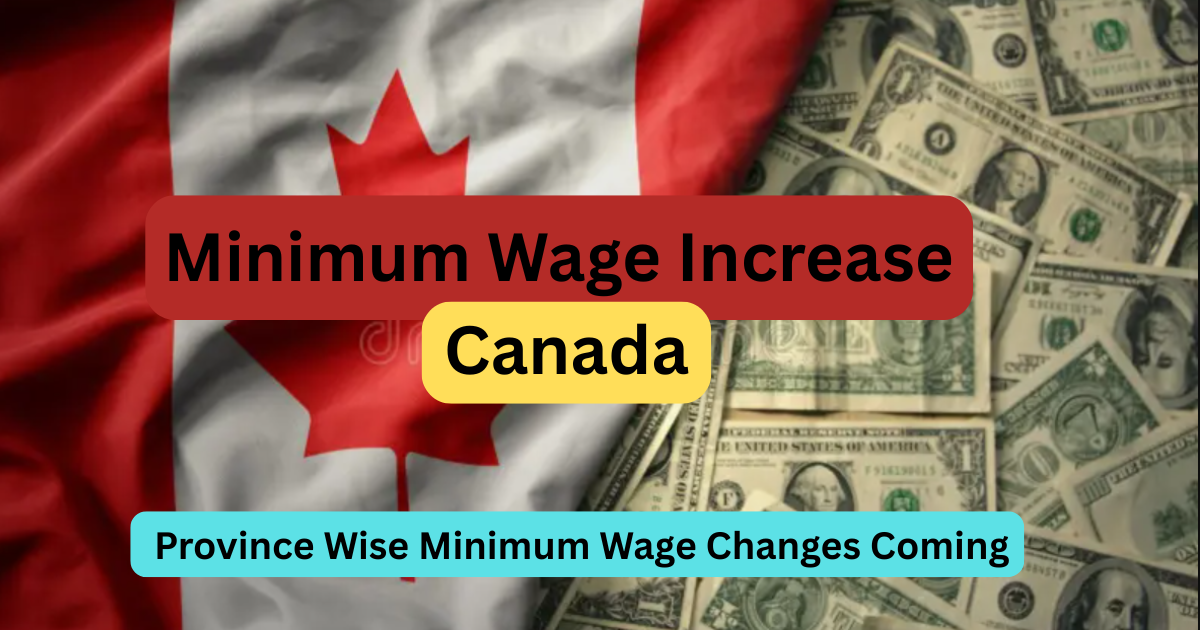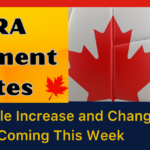Minimum Wage Increase Canada: Province-Wise Minimum Wage Changes Coming. The Canada Minimum Wage Increase in 2025 will see wages rise across several provinces, it is helping workers keep up with inflation. Check out the province-by-province breakdown, understand why these changes matter, and why it is happening.
Minimum Wage Increase Canada
The minimum wage in Canada is set to increase in 2025, impacting workers, businesses, and the overall economy. Whether you are an employee wondering about your new earnings or an employer preparing for payroll adjustments, understanding the province-wise Breakdown is important.

With inflation and cost-of-living concerns at the forefront, governments across Canada are adjusting minimum wage rates to help workers keep up with rising expenses. Below, we break down the new wage rates, why these changes are happening, and how they affect both employees and businesses. The minimum wage increase in Canada for 2025 is an important step in ensuring fairness for workers while balancing economic sustainability for businesses. With province-specific adjustments, workers can expect higher earnings, while these changes help both employees and employers prepare for the evolving economic landscape.
What is the Minimum Wage Increase in Canada for 2025
Understanding Minimum Wage Adjustments
Every year, provincial and federal government assess minimum wage rates based on inflation, economic conditions and cost-of-living factors. In 2025, Canada will see new minimum wage increase ensuring fair compensation for workers while balancing employer expenses.
Why is the Minimum wage Increasing?
1. Inflation: Rising prices of goods and services necessitate wage adjustments.
2. Cost of living: Housing, food, and transportation costs are climbing nationwide.
3. Economic Growth: Higher wage stimulate consumer spending boosting nationwide.
4. Fair Wages advocacy: Labor unions and social groups push for better workers compensation.
5. International Comparisons: Canada aligns itself with global labor standards to maintain competitiveness.
6. Workforce Retention: Higher wages help reduce employee turnover and attract talent.
Province-Wise Minimum Wage Increase for 2025
Province and territory sets its own minimum wage, which varies based on economic conditions.
1. British Columbia
- Current Minimum Wage:$16.75 per hour, following inflation indexing.
- Trend: BC has consistently led growth in Canada
2. Alberta
- Current Minimum Wage:$15.00 per hour
- Project increase: Adjustments expected based on provincial review,
- Employer Challenges: Balancing economic recovery and wage hikes.
3. Saskatchewan
- Current Minimum Wage:$14.00 per hour
- 2025 Estimate: Future hikes anticipated to match national trends.
- Economic Impact: Low unemployment rates driving wage increases.
4. Manitoba
- Current Minimum Wage:$15.30 per hour
- Expected 2025 increase: LIKLY above $16 per hour.
- Consumer Perspective : Wage growth may improve local purchasing power.
5. Ontario
- Current Minimum Wage:$16.55 per hour
- Projected 2025 increase Adjustment based on inflation, possibility reaching $17+.
- Influence: Ontario`s economic polices shapes national labor trends.
6. Quebec
- Current Minimum Wage: Range Between $15.00 per hour
- 2025 Estimates: Increase expected To keep pace with inflation
- Current Impact: wage laws tied to financial and social policies.
7. Atlantic Provinces (Nova Scotia, New Brunswick, PEI, Newfoundland & Labrador)
- Current wages: Range between $15.00- 15.50 per hour
- 2025 Estimates: likely to surpass $16 per hour across the region.
- Government Role: Programs to assist small businesses in wage transitions.
8. Territories (Yukon, Northwest Territories, Nunavut)
- Current wages: Vary significantly, with Yukon leading at 16.77
- 2025 Estimates: Adjustments based on economic conditions and inflation
- Government Role: Harsh climates and cost of living disparities.
Practical Implications of Wage Increase
For Workers
- Increased Take-Home Pay: Higher wages mean more disposable income for housing, food, and transportation.
- Improved Job Satisfaction: Fair pay fosters workplace satisfaction and loyalty
- Budget Opportunities: Workers can plan for savings or investments with the additional income.
- Better Quality of Life: Higher wages reduce financial stress and improve living conditions.
For Employers
- Increased Labor Costs: Businesses should anticipate higher payroll expenses and budget accordingly.
- Retention and Recruitment: Competitive wages attract and retain talent, reducing turnover costs.
- Many Adjustments: To adjust, the businesses may need to arrange the money goods and services to offset higher wages.
- Changes in Hiring Practices: Employers might seek to reduce costs by hiring part-time workers or using temporary contracts.
- Boost to Consumer Spending: While businesses may face higher labor costs, workers with higher wages will likely spend more, benefiting the economy.
Conclusion
In this article we discussed the Minimum Wage Increase Canada: Province-Wise Minimum Wage Changes Coming. The minimum wage increase in Canada for 2025 is an important step in ensuring fairness for workers while balancing economic sustainability for businesses. With inflation and cost-of-living concerns at the forefront, governments across


